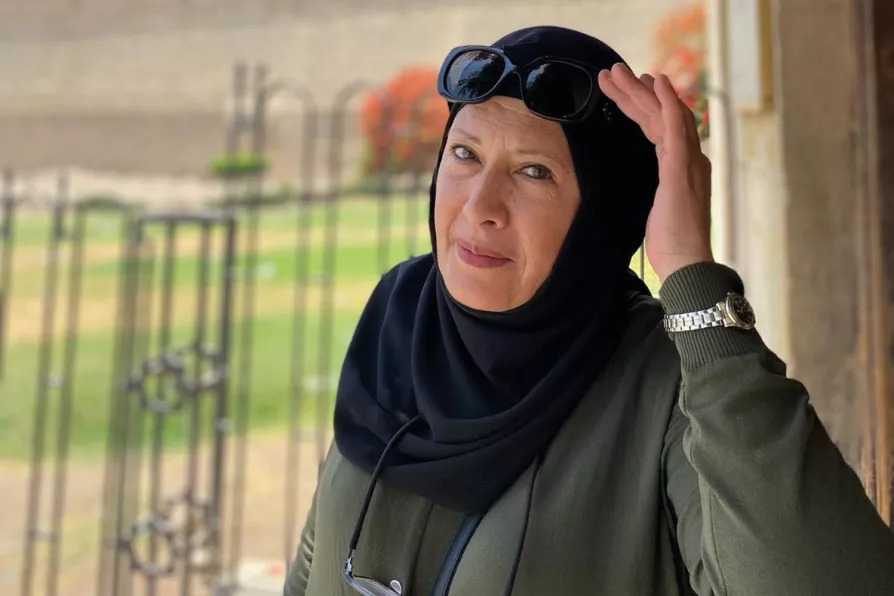As tens of thousands return to the streets for the first national Palestine march of 2026, this movement refuses to be sidelined or silenced, says PETER LEARY

 Dr Soma Baroud
Dr Soma Baroud
“YOUR lives will continue. With new events and new faces. They are the faces of your children, who will fill your homes with noise and laughter.”
These were the last words written by my sister in a text message to one of her daughters.
Dr Soma Baroud was murdered on October 9 when Israeli warplanes bombed a taxi that carried her and other tired Gazans somewhere near the Bani Suhaila roundabout near Khan Yunis, in the southern Gaza Strip.
I am still unable to understand whether she was on her way to the hospital, where she worked, or leaving the hospital to go home. Does it even matter?
The news of her murder — or, more accurately, assassination, as Israel has deliberately targeted and killed 986 medical workers, including 165 doctors — arrived through a screenshot copied from a Facebook page.
“Update: these are the names of the martyrs of the latest Israeli bombing of two taxis in the Khan Yunis area … ” the post read.
It was followed by a list of names. “Soma Mohammed Mohammed Baroud” was the fifth name on the list, and the 42,010th on Gaza’s ever-growing list of martyrs.
I refused to believe the news, even when more posts began popping up everywhere on social media, listing her as number five, and sometimes six in the list of martyrs of the Khan Yunis strike.
I kept calling her, over and over again, hoping that the line would crackle a bit, followed by a brief silence, and then her kind, motherly voice would say, “Marhaba Abu Sammy. How are you, brother?” But she never picked up.
I had told her repeatedly that she does not need to bother with elaborate text or audio messages due to the unreliable internet connection and electricity. “Every morning,” I said, “Just type: ‘We are fine.’” That’s all I asked of her.
But she would skip several days without writing, often due to the lack of an internet connection. Then, a message would arrive, though never brief. She wrote with a torrent of thoughts, linking up her daily struggle to survive, to her fears for her children, to poetry, to a Koranic verse, to one of her favourite novels, and so on.
“You know, what you said last time reminds me of Gabriel Garcia Marquez’s 100 Years of Solitude,” she said on more than one occasion, before she would take the conversation into the most complex philosophical spins. I would listen, and just repeat, “Yes … totally … I agree … one hundred per cent.”
For us, Soma was a larger-than-life figure. This is precisely why her sudden absence has shocked us to the point of disbelief. Her children, though grown up, felt orphaned. But her brothers, me included, felt the same way.
I wrote about Soma as a central character in my book My Father Was a Freedom Fighter, because she was indeed central to our lives, and to our very survival in a Gaza refugee camp.
The firstborn and only daughter, she had to carry a much greater share of work and expectations than the rest of us.
She was just a child when my eldest brother Anwar, still a toddler, died in an UNRWA clinic at the Nuseirat refugee camp due to the lack of medicine. Then, she was introduced to pain, the kind of pain that, with time, turned into a permanent state of grief that would never abandon her until her murder by a US-supplied Israeli bomb in Khan Yunis.
Two years after the death of the first Anwar, another boy was born. They also called him Anwar so that the legacy of the first boy may carry on. Soma cherished the newcomer, maintaining a special friendship with him for decades to come.
My father began his life as a child labourer, then a fighter in the Palestine Liberation Army, then a police officer during the Egyptian administration of Gaza, then, once again, a labourer; that’s because he refused to join the Israeli-funded Gaza police force after the war of 1967, known as the Naksa.
A clever, principled man and a self-taught intellectual, my dad did everything he could to provide a measure of dignity for his small family; and Soma, a child, often barefoot, stood by him every step of the way.
When he decided to become a merchant, buying discarded and odd items in Israel and repackaging them to sell in the refugee camp, Soma was his main helper. Though her skin healed, cuts on her fingers, due to individually wrapping thousands of razors, remained a testament to the difficult life she lived.
“Soma’s little finger is worth more than a thousand men,” my father would often repeat, to remind us, ultimately five boys, that our sister will always be the main heroine in the family’s story. Now that she is a martyr, that legacy has been secured for eternity.
Years later, my parents would send her to Aleppo to obtain a medical degree. She returned to Gaza, where she spent over three decades healing the pain of others, though never her own.
She worked at Al-Shifa Hospital, at Nasser Hospital among other medical centres. Later, she obtained another certificate in family medicine, opening a clinic of her own. She did not charge the poor and did all she could to heal those victimised by war.
Soma was a member of a generation of female doctors in Gaza that truly changed the face of medicine, collectively putting great emphasis on the rights of women to medical care and expanding the understanding of family medicine to include psychological trauma with particular emphasis on the centrality, but also the vulnerability of women in a war-torn society.














